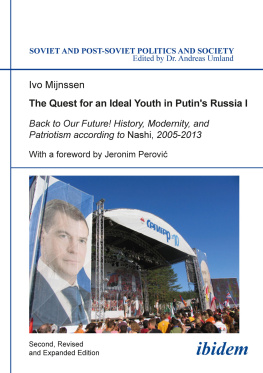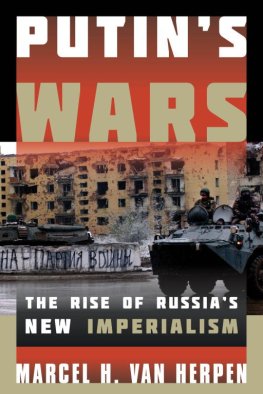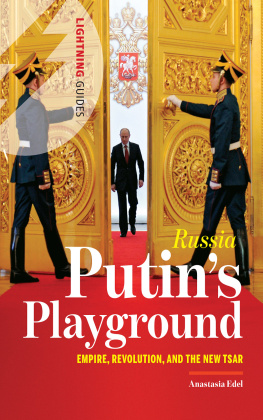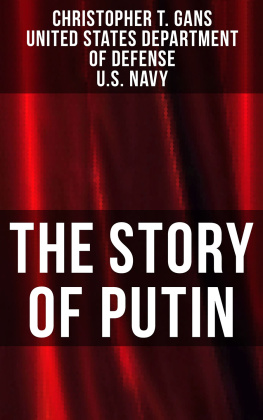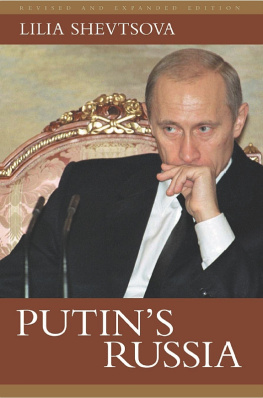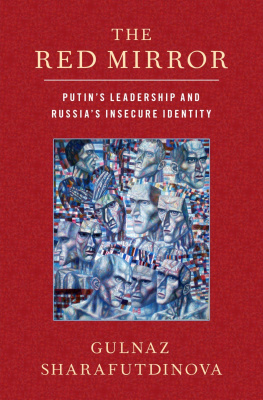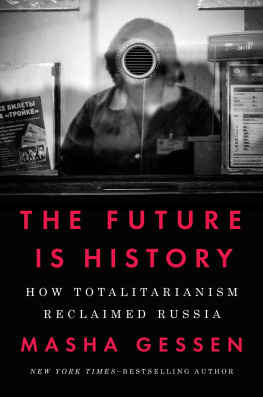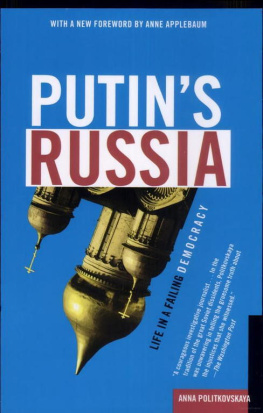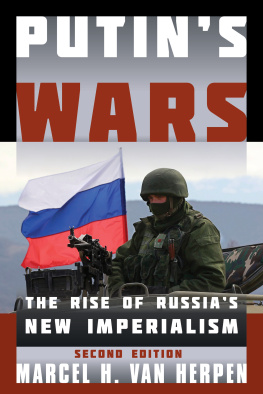Preface
My interest in Nashi began with the organizations first demo n stration in 2005: the fact that a youth organization had used the commemor a tion of the Great Patriotic War to mobilize young Russians was very surpri s ing to my Western European mind. Young people in Switzerland are more soporific than ene r getic when discussions or lessons in school turn to histor i cal issues.
In Russia, however, war memory is held sacred by a vast majority of the po p ula tion and continues to serve an important societal and political function. That a state-sponsored youth movement would use this memory as the basis of its identity is thus less surprising than it first seemed. The goal of this book is to show the role that war memory played for Nashi and its link to various aspects of the movements identity concepts and ideo l ogy.
I developed Back to Our Future out of a Masters thesis at the University of Basel, submitted in 2010. Since then, I have revised and translated the book, added a chapter and new materials. I did research for this book in St. Peter s burg, Moscow, at Lake Seliger, at Stanford University, in Zrich, Bern and Basel.
After finishing the book in August 2012, the opportunity arose to publish a second, revised and extended edition of the book in late 2013. The new ed i tion includes current developments, some minor corrections and an improved i n dex at the end. By covering Nashis development from 2005-2013, the book now contains the organizations entire history, as it was di s banded in early 2013. Other state-sponsored youth organizations have taken Nashis place, and new ones will undoubtedly be founded when the need arises to demo n strate unity and youth support for the Putin regime. It is my hope that this book in conjunction with the parallel volume written by my colleague Jussi Lassila will also continue to contribute to a better unde r standing of youth politics in Russia in the f u ture.
I first want to thank my Russian friends and colleagues who have helped me understand Russian politics better. Danila Korogodskii hosted me in St. P e tersburg and provided me with an astute and critical view on his country. Alla Lapidus guided me through the challenges of working in the Russian National Library, and Sergei Simonov, editor of politgramota.ru , took a lot of time to explain the intricacies of Russias youth politics to me . I want to thank the two Nashi commissars , who spoke to me so openly , for their valuable insights into the organizations inner workings. This book would have been much less rich without my participation in the International Youth Forum Seliger 2010 . In spite of all its proble m atic aspects, I want to thank the organizers of the forum for inviting international students to the beautiful shores of Seliger. It was, however, the Russian volunteers who acted as unpaid mediators and transl a tors between internationals and Ru s sians who deserve the highest praise. I am particularly grateful to Dima, Masha and P o lina.
I did a lot of work on this book during my year as a Visiting Scholar at the Center for Russian, East European and Eurasian Studies at Stanford Unive r sity (CREEES) . I am grateful to Professor Emeritus Abbott Gleason and Pr o fessor Norman Naimark for making this year possible, and to Rob Wessling , Bob Crews, Karen Haley and Van-Anh Nguyen for the continued support at the Center.
The graduate students at CREEES and in Russian and Eastern European History made sure I felt welcome on campus. I want to thank Markian Do b czansky and Dan Heller for reading drafts of chapters. Jussi Lassila read the entire manuscript and gave me very useful feedback. Anna Whittington did a tremendous job editing the book European style and making sure my Ge r man did not get in the way of readable English prose. I am also grateful for series editor Andreas Umlands formatting work.
This project began and ended in Switzerland. Professor Emeritus Heiko Haumann was a great first reader of my MA-thesis, and Professor Jeronim Perovic deserves thanks for being a second reader and writing the foreword. Last but not least, Dr. Philipp Casula has for the past five years been a wo n derful colleague and critic of my work.
At different times, this work absorbed me heavily. I therefore want to thank my family. My parents Daniela and Pete read early drafts of the thesis, and my brother Remo was an amazing study partner during the summer of 2009. My wife Jessy, finally, not only read multiple drafts of the English manuscript but also made sure I could focus on my work and not get too absorbed by it. Without her, life would be much less fun.
Ivo Mijnssen
Zrich, January 2014
Foreword
On 7 May 2012, Vladimir Putin was inaugurated as Pre s ident of the Russian Federation, reclaiming the office he held from 2000 to 2008 and resuming the mantle of power that he had never fully relinquished to Dmitry Medvedev. Looking back at past achievements, he d e clared in his inaugural speech that we strengthened our country and r e turned our dignity as a great nation , so that the world has seen Russia risen anew . The new Russia Putin intends to build is a Russia looking back. The dignity restored means a correction of past errors, the biggest of which Putin sees in the decision to dissolve the Soviet Union, an event that he once described as the greatest geopolit i cal catastrophe of the 20 th century. While Putin recognizes that a return to Sov i et times is impossible, he promised in his inaugural speech to make Russia the leader and centre of gr avity for the whole of Eurasia. He has the cou n trys great past and its hundreds of years of history in mind, thus, if not explicitly, holding up the imper i al era as a model for the future.
Russias still considerable military, political and economic weight, as well as its crucial importance as an energy supplier to Europe, mean that the West cannot afford to ignore developments in this country. Either way Russia turns will affect stability and security on the Eurasian continent. Russias actions in the recent past, repeatedly cutting energy supplies to costumers west of its borders, invadi ng Georgia in August 2008 with disproportionate use of force, suppressing free media, and cracking down on political opposition all clearly point toward a less cooperative Russia when dealing with the West, a more aggressive Russia when defending interests in its near abroad, and a more authoritarian system domestically. Yet if most would agree that Russia has become more assertive under Putins leadership, few understand the ideolo g ical and sociopolitical underpinnings of this develo p ment. If official rhetoric and behavior tell only half of the story at best, then it is necessary to take a deep look into society itself.
Ivo Mijnssen chose to do precisely this when he examined the Russian youth organization called The Democratic Anti-Fascist Youth Movement Nashi .
Nashi , which means Ours in English translation, was founded in 2005 and claimed several tens of thousands of members in dozens of Russian regions at the peak of its existence during 2005-07. Although a large organization, it is certainly not to be compared with Soviet youth organiz a tions, such as the Young Pioneers , or Komsomol , with memberships in the tens of millions. In fact, many Russians are not even aware of Nashi s e x istence, as opinion polls show. Yet because Nashi is an organization initiated and founded direc t ly by the Kremlin, as is widely acknowledged today in the literature, loo k ing into its organizational structure, slogans, manifestos, and actions help to be t ter understand state ideology and goals. What polit i cians like Putin might not find suitable to utter publicly, the leaders of Nashi , the so-called commi s sars , never hesitate to do.

